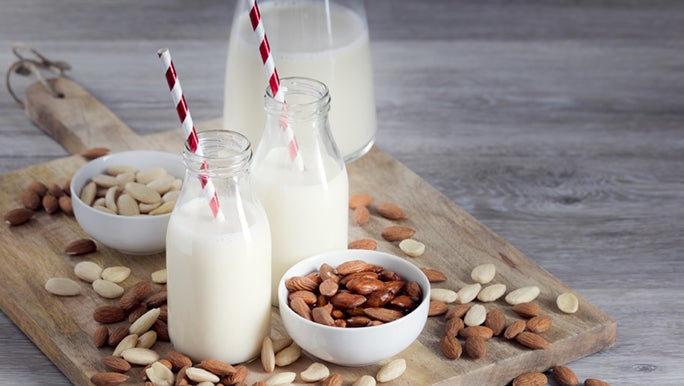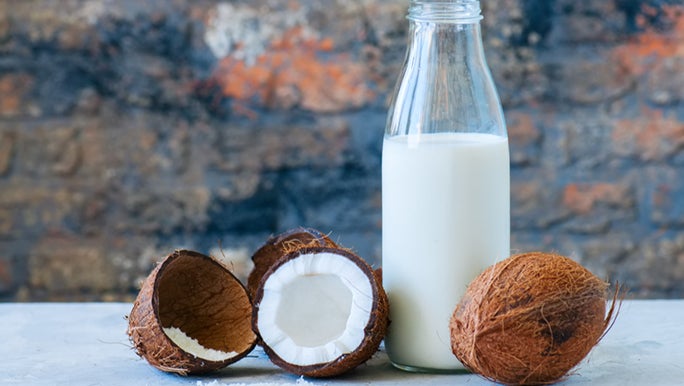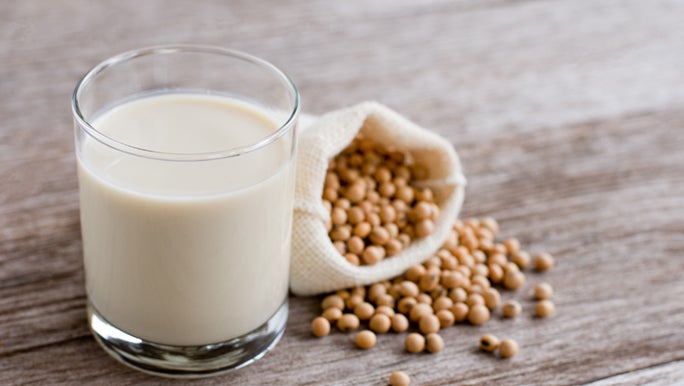While cow’s milk is a long-standing staple in many Australian fridges, more and more dairy milk alternatives are becoming widely available.
Let’s look at five popular options to help you decide what the best dairy milk alternative might be for you.
Soy milk
Made from soybeans, soy milk is classed as a complete protein. Since soybeans are made from plant foods, soy milk is vegan.
It can be a good source of protein, carbohydrates and B vitamins. Soy milk is regularly fortified with calcium and other nutrients. Supermarkets have loads of brands to choose from, but be sure to check the labels and see what’s included in each brand’s ingredients list.

If cow’s milk isn’t an option for you, consider a vegan alternative.
Almond milk
No surprises here, almond milk is derived from almonds.
Not only is it dairy free, but it’s also soy free and lactose free which ticks many boxes for people with medically diagnosed allergies.
It's important to read the label before buying as the actual almond content may vary between brands. Almond milk is vegan unless it has been sweetened with honey, so it’s a good alternative to dairy to consider trying.
Also check the label for the number of grams of calcium per serving.

Almond milk is dairy free, soy free and lactose free.
Coconut milk
A popular choice for Asian style cooking, coconut milk is made from the grated flesh of a mature coconut.
It is high in saturated fat but low in carbohydrates. It is also low in protein and doesn’t naturally contain calcium. As such, coconut milk may not be best for you if you are looking for a plant-based substitute to dairy milk that has similar nutritional benefits. If you have any health concerns, speak to your health professional before trying a dairy milk alternative.

Coconut milk is high in saturated fat but low in carbohydrates.
Oat milk
Oat milk is vegan friendly as it's basically made using oats and water. It's lower in certain nutritional values, such as calcium and protein, so a fortified option may be a better option.
But oat milk packs a bigger punch than other dairy milk alternatives for fibre content, specifically beta-glucan, which could potentially help reduce blood cholesterol.
However, it is naturally sweet so may not be suitable for people living with diabetes. Check with your dietitian or health professional to see if this would be a good addition to your diet.

Soy milk can be a good source of protein, carbohydrates and B vitamins.
Rice milk
A lot of the carbohydrates in rice are broken down into sugar during the process of making rice milk. You may find it tastes quite sweet, so it doesn't usually need any added sugar to improve the taste.
However, it is low in protein. So, you may want to consider other vegan protein substitutes to help maintain a balanced diet. Rice milk also tends to be naturally low in calcium so a fortified option may be a better option.
Milk alternatives and more
If you’re looking into how to go vegan or starting a plant-based diet, some people find it helpful to try different dairy milk alternatives.
With many different ways of eating, it's useful to know what a flexitarian is as well as the differences between plant-based and vegan diets. You may decide to investigate various food alternatives to help make appropriate choices for you and your family.
If you want to learn more about plant-based eating, you can find out how vegans get their protein and the answers to important FAQs, such as ‘is chicken salt vegan?’ in some of our other articles here on the healthylife website.
No matter which food you choose, it's important to check you’re getting all the important nutrients. Speak to your health professional for more guidance.
Related:
Reviewed by the healthylife Advisory Board December 2021.




